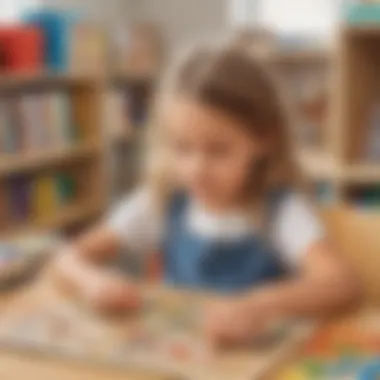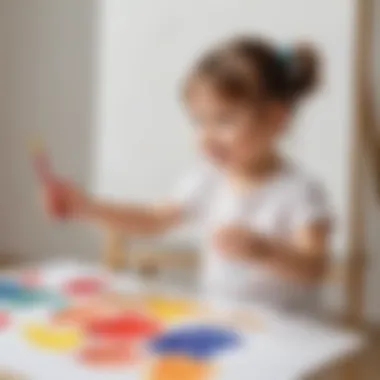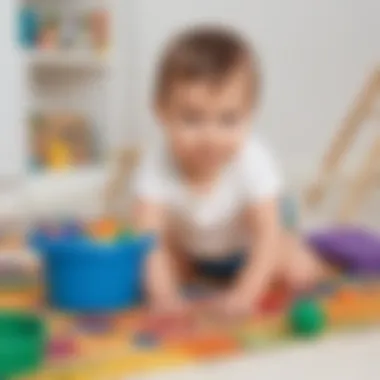Engaging Activities for Kindergarteners: Fun and Educational Games


Fun Activities Ideas
When it comes to engaging activities for kindergarteners, there is a plethora of fun and educational options to explore. From stimulating indoor activities to exciting outdoor adventures, children can embark on a journey of creativity and discovery. Arts and crafts provide an excellent outlet for artistic expression, while science experiments offer hands-on learning experiences. Additionally, cooking and baking activities not only spark culinary interest but also teach valuable life skills.
Indoor Activities
Engaging kindergarteners in indoor activities encourages creativity and cognitive development. From building forts with blankets to putting on puppet shows, there are countless ways to keep young minds active and imaginative. Indoor scavenger hunts and sensory bins filled with various textures provide opportunities for sensory exploration and problem-solving skills development.
Outdoor Adventures
Outdoor adventures offer kindergarteners the chance to connect with nature and engage in physical activity. Nature walks, scavenger hunts in the backyard, and planting a small garden can instill a sense of environmental stewardship and curiosity about the world around them. Furthermore, playground visits and picnics in the park promote social interaction and gross motor skills development.
Arts and Crafts
Encouraging artistic expression through arts and crafts activities can spark creativity and foster fine motor skills in kindergarteners. From finger painting and clay modeling to creating handmade cards and simple sewing projects, children can explore different mediums and techniques. Engaging in arts and crafts also promotes self-expression and boosts confidence in young artists.
Science Experiments
Introducing simple science experiments to kindergarteners not only cultivates a love for learning but also develops critical thinking skills. Conducting experiments like making slime, creating erupting volcanoes, or exploring buoyancy with DIY boats provides hands-on experiences that pique curiosity and encourage scientific exploration. Science experiments offer a playful way for children to understand the world around them.
Cooking and Baking
Involving kindergarteners in cooking and baking activities fosters a sense of independence and teaches valuable lessons about nutrition and food preparation. From decorating cookies to assembling sandwiches, children can explore flavors and textures while developing basic culinary skills. Cooking and baking also offer opportunities for math learning through measuring ingredients and following recipes.
Introduction
This segment delves into the realm of engaging activities specifically tailored for kindergarteners. It aims to provide a detailed exploration of interactive and educational games that not only entertain but also contribute significantly to the learning journey of young minds. By offering a diverse range of activities spanning from sensory play to cognitive development and physical movement, this section serves as a comprehensive guide for parents, teachers, and caregivers seeking to optimize playtime for children's holistic growth.


Understanding the Importance of Play
Placing emphasis on the fundamental role of play in children's development is crucial. Play serves as a medium through which kindergarteners explore their surroundings, enhance their social skills, and stimulate creativity. It acts as a foundation for learning, aiding in the absorption of knowledge and fostering a love for exploration and discovery in young learners.
Benefits of Interactive Games for Kindergarteners
Interactive games offer a myriad of advantages for kindergarteners. These activities promote cognitive development, enhance problem-solving skills, and improve language abilities. Moreover, interactive games encourage physical movement and gross motor skills while also nurturing creativity and artistic expression. By engaging in such games, children not only have fun but also experience holistic growth across various domains.
Overview of the Article
This article serves as a guiding beacon for parents, teachers, and caregivers navigating the world of engaging activities for kindergarteners. It spans a spectrum of play options, from sensory play activities that stimulate the senses to educational games focused on cognitive development. Whether it be through physical movement challenges or artistic endeavors, this article provides a holistic approach to fostering learning and creativity in young children. Embracing the essence of play, each section offers unique insights and practical tips to make playtime not only enjoyable but also enriching for kindergarteners.
Sensory Play Activities
Sensory play activities are a crucial aspect of early childhood development, particularly for kindergarteners. Engaging in sensory play helps children explore and make sense of the world around them through their senses, including touch, smell, taste, sight, and sound. By actively participating in sensory experiences, young learners refine their sensory processing skills, enhance cognitive development, and improve language and fine motor skills. These activities encourage creativity, boost problem-solving abilities, and promote social interactions among children.
Exploring Texture and Sensory Stimulation
Exploring textures and sensory stimulation plays a vital role in stimulating a child's sensory receptors and enhancing their perceptual abilities. By offering children a variety of textures to touch, feel, and manipulate, such as smooth, rough, soft, and hard materials, educators and parents can support the development of sensory processing skills. Through activities like sandboxes, sensory bins filled with rice, beans, or water, and tactile games involving different textures, kindergarteners can enhance their tactile sensitivity, hand-eye coordination, and proprioceptive feedback. This hands-on exploration not only sparks curiosity but also lays the foundation for more complex cognitive tasks.
Sensory Bins and Exploration Games
Sensory bins and exploration games are innovative ways to engage kindergarteners in sensory play while promoting their cognitive and social skills. These activities involve creating themed sensory bins filled with materials like dried pasta, buttons, fabric scraps, or natural elements such as leaves and flowers. By incorporating scooping tools, tweezers, and measuring cups, children can strengthen their fine motor skills, practice spatial reasoning, and encourage imaginative play. Additionally, exploration games like sensory scavenger hunts or object-matching activities help children develop problem-solving strategies, enhance memory retention, and refine their visual discrimination abilities in a playful and interactive manner.
Mess-Free Sensory Play Ideas
Mess-free sensory play offers an alternative approach for parents and educators who may be concerned about the cleanup involved in traditional sensory activities. These ideas present opportunities for kindergarteners to engage in sensory experiences without the potential mess, utilizing materials like dry sensory bins with kinetic sand, water beads, or textured fabrics that are easy to contain and clean up. Activities such as sensory bottles filled with glitter, sensory dough kits, or sensory wall boards allow children to explore different sensory inputs and engage in calming or stimulating experiences without creating a cluttered environment. By implementing these mess-free sensory play ideas, caregivers can provide children with a sensory-rich environment while maintaining a tidy and organized play space.


Educational Games for Cognitive Development
Educational games for cognitive development play a crucial role in this comprehensive guide dedicated to engaging activities for kindergarteners. By incorporating educational games, children can enhance their cognitive abilities while having fun. These games are meticulously designed to boost critical thinking skills, problem-solving abilities, and overall intellectual development in young learners. Parents, teachers, and caregivers can leverage these games to not only entertain but also educate children, making learning a joyful experience.
Mathematics and Number Recognition Games
Counting with Colors Game
Counting with Colors Game introduces children to the world of numbers through a vibrant and engaging approach. Utilizing colorful elements, this game aids in number recognition and basic mathematics skills. The primary focus is to make learning numbers fun and interactive for kindergarteners. The game's immersive nature captivates children's attention, promoting active engagement and retention of numerical concepts. Its innovative design encourages practical application of counting, fostering a deeper understanding of mathematical principles. Counting with Colors Game stands out as a top choice in this article for its ability to merge learning with enjoyment seamlessly.
Shape Sorting Challenges
Shape Sorting Challenges are instrumental in enhancing spatial awareness and geometric comprehension in young children. By presenting various shapes to categorize and organize, this game promotes logical thinking and problem-solving skills. The key characteristic of this game lies in its ability to sharpen cognitive abilities while entertaining and stimulating young minds. Shape Sorting Challenges offer a structured yet dynamic learning experience, where children can explore different shapes and analyze their attributes. Although challenging, this game's capacity to build analytical skills and shape recognition makes it a valuable addition to this article, despite its level of complexity.
Language and Literacy Activities
Alphabet Scavenger Hunt
Alphabet Scavenger Hunt serves as a captivating method to introduce and reinforce letter recognition among kindergarteners. This activity encourages children to actively search for letters in their surroundings, fostering a hands-on learning approach. The key characteristic of this scavenger hunt is its versatility in adapting to various environments, making it a versatile choice for educators and parents. By combining physical movement with literacy tasks, Alphabet Scavenger Hunt promotes holistic development in language skills and cognitive abilities. While inherently beneficial, this activity may require careful supervision to ensure children remain focused and safe during the learning process.
Rhyming Word Memory
Rhyming Word Memory is an innovative way to enhance phonological awareness and memory skills in young learners. By correlating sound patterns and visual memory, this game exercises both linguistic and cognitive functions simultaneously. The critical aspect of Rhyming Word Memory lies in its capacity to improve auditory discrimination and vocabulary retention through engaging gameplay. Its unique feature of combining rhyming words with memory challenges offers a distinctive learning opportunity for kindergarteners. Although beneficial, this activity demands active participation and mental acuity from children, contributing to their language development and cognitive growth.
Problem-Solving and Critical Thinking Games
Physical Movement and Gross Motor Skills


Physical movement and gross motor skills are crucial aspects in the development of kindergarteners. This section delves deeply into the significance of promoting active play and enhancing motor skills in young children. By engaging in activities that involve physical movement, children not only improve their coordination and balance but also boost their overall physical health. Parents, teachers, and caregivers must understand the importance of allowing kids to explore different movements and activities to support their growth and development.
Obstacle Courses and Relay Races
Obstacle courses and relay races are exciting and educational games that promote physical activity and teamwork among kindergarteners. In obstacle courses, children navigate through various challenges that test their agility, balance, and problem-solving skills. These activities not only enhance gross motor skills but also foster resilience and determination in children. Similarly, relay races encourage coordination, cooperation, and healthy competition among kids. By incorporating these activities into playtime, children not only have fun but also develop essential physical and social skills.
Dance Party Challenges
Dance party challenges offer a dynamic way for children to engage in physical movement and creative expression. Through dancing, kids can improve their coordination, rhythm, and gross motor skills while having a great time. Dancing to different beats and styles allows children to explore various movements and develop their motor skills in an enjoyable and interactive way. Dance party challenges not only promote physical activity but also boost self-confidence and self-expression in kindergarteners.
Balancing and Coordination Activities
Balancing and coordination activities play a vital role in enhancing children's motor skills and physical development. By incorporating games that focus on balance and coordination, such as walking on a balance beam or playing with balance boards, kids can improve their stability and spatial awareness. These activities also help strengthen core muscles and improve posture in young children. Developing balance and coordination skills at a young age is essential for overall physical growth and lays a solid foundation for future motor competence.
Artistic Expression and Creativity
Artistic expression and creativity play a pivotal role in this article, focusing on fostering imagination and self-expression in kindergarteners. Encouraging children to engage in artistic activities nurtures their cognitive and emotional development, allowing them to explore and communicate feelings and ideas in a visually creative manner. By incorporating art into learning, children can enhance their problem-solving skills, fine motor coordination, and decision-making abilities, making it an essential aspect of holistic development.
DIY Craft Projects and Artistic Adventures
Enabling kindergarteners to delve into do-it-yourself craft projects and artistic adventures nurtures their creativity and fine motor skills. Through hands-on activities like painting, cutting, and pasting, children can unleash their imagination and create personalized artworks. Engaging in DIY crafts not only boosts self-esteem and confidence but also offers a therapeutic outlet for young minds to express themselves artistically and experiment with different materials.
Storytelling and Puppetry Performances
Storytelling and puppetry performances captivate children's attention, fostering language development, creativity, and emotional intelligence. Through puppet making workshops, children can craft their puppets, enhancing their storytelling skills and imaginative play. The hands-on experience of creating characters and narratives ignites a sense of wonder and curiosity in children, making storytelling a powerful tool for communication and expression.
Puppet Making Workshop
The Puppet Making Workshop provides a hands-on experience where children can create their puppets using various materials such as socks, paper bags, or craft sticks. This activity not only enhances creativity and fine motor skills but also encourages independent thinking and problem-solving. The unique feature of the Puppet Making Workshop lies in its ability to allow children to bring their characters to life, fostering storytelling abilities and building confidence in self-expression.
Imaginative Story Circle
The Imaginative Story Circle offers a collaborative storytelling experience where children come together to create imaginative narratives. This activity promotes teamwork, language development, and creativity as children co-create stories and explore diverse themes. The key characteristic of the Imaginative Story Circle is its ability to inspire originality and critical thinking in children, encouraging them to think outside the box and express their unique perspectives.



